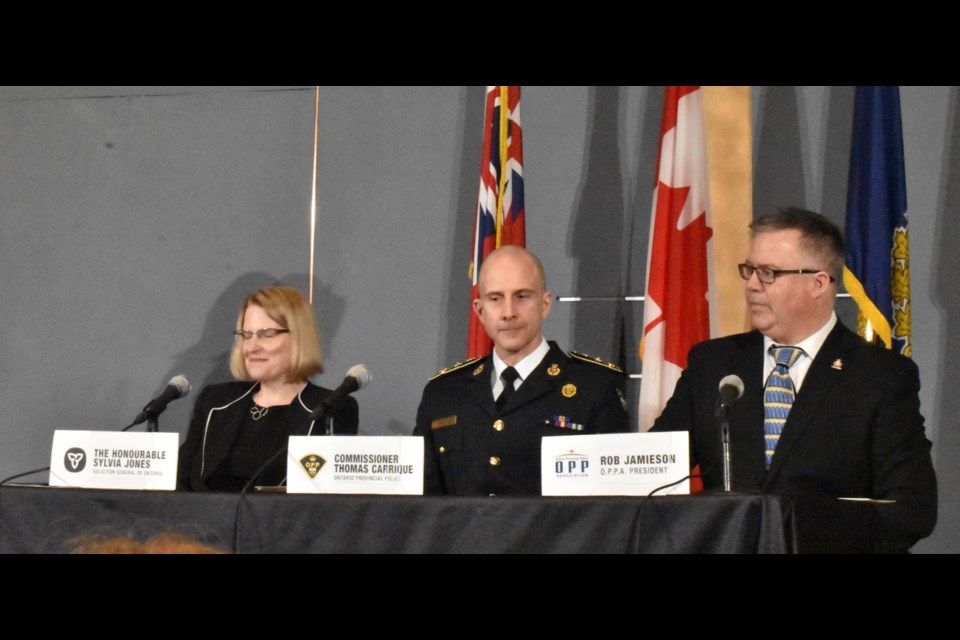Back in November, Jeff Harmer, an OPP staff sergeant who worked in the forensic identification unit at OPP General Headquarters in Orillia, took his own life.
It was believed to be the 14th death by suicide from within the OPP ranks in the last few years.
The death of the 50-year-old father of two left the tight-knit policing community reeling - again.
OPP Commissioner Thomas Carrique, who assumed the helm of the 9,000-member organization 11 months ago, has pledged to improve the culture of the organization to ensure things improve and to ensure officers and civilians have the support they need.
“It’s absolutely the priority of mine as commissioner and the priority of our entire leadership team right across the province,” said Carrique, following a press conference Monday at General Headquarters.
“We are seeing an evolution of policing culture” happening across North America, noted Carrique, adding the process of changing a culture within a policing organization is not easy and will take time.
Carrique joined Ontario’s Solicitor General, Sylvia Jones, and Rob Jamieson, the president of the Ontario Provincial Police Association (OPPA) to announce the findings of an independent review panel which examined the OPP’s workplace culture and “how the force addresses staff mental health, occupational stress injuries and suicide among its members.”
The panel was established in April of 2019. Some of the report’s primary recommendations include:
- Making health and wellness an organizational priority;
- Fostering new leadership and leadership skills training; and
- Developing programs that de-stigmatize stress and mental health issues.
“Occupational stress injuries can take a horrible toll on our first responders ... and when they choose to take their own life we know much more needs to be done,” said Jones.
She said the panel’s report is “critical to assist changes we are making to ensure a healthier, more positive and supportive workplace within the OPP.”
Jones said the province has also supported the OPPA to implement a new mental health support program that will help “the OPP and their families cope with work-related stress and injuries.”
She noted “42 of the review panel’s 66 recomendations are complete, near complete or well underway.”
“The independent review panel also identified the need for increased number of members available for operational positions with attention to the most critical shortages … (and) this is something our government is working on,” said Jones.
Carrique lauded the process and said the panel’s findings “corroborate” findings from its own internal reviews.
“Our leadership team is committed to learning from our past, meaningfully engaging in the present and taking responsibility for creating a better future for our members and their families,” said Carrique, noting they have listened to their members.
As a result, the OPP, he said, has “improved access to services and removed barriers” to help.
For example, Carrique said the OPP has created a “healthy workplace bureau that reports directly to the commissioner’s command team and is overseeing the implementation of the recommendations from the various reviews.”
He also noted new working groups have been established to “address an organizational response to officer suicides, the removal and return of use-of-force equipment, accommodations and return to work processes.”
He also said training would be enhanced among other issues. But he also conceded that leadership and trust are critical to the process.
It's the OPP leadership's "responsibility to look after those who risk it all to look after our communities and protect our citizens," Carrique stressed.
“It also comes down to building trust,” said Carrique, who said many positive steps have been taken since he became commissioner. “Today is a big step.”
Jamieson agreed.
“It is a big step,” said Jamieson, noting it takes courage to “address years of organizational issues and throw it out there in the public domain.”
While difficult, it’s necessary, he stressed.
“We owe it to the widows, the spouses, the family members and to our members,” he said.
Jamieson said he has high hopes staffing levels will be addressed by the province.
“I am very pleased to see provincial staffing levels addressed” in the panel’s report, Jamieson said, adding “the link between wellness and staffing shortages is irrefutable.”
After the media conference, he said staffing shortages and burnout of front-line officers and civilians alike are linked to mental health issues.
“We know we are down hundreds and hundreds of people across the province,” he said of OPP staff reductions. “That has a huge effect on mental health and on the well-being of our people.”
He noted Premier Doug Ford and Solicitor General Jones have been “incredibly supportive” and added, “we anticipate, from investments they’re making, that will help us with staffing.”
To read the panel’s final report, click here.



